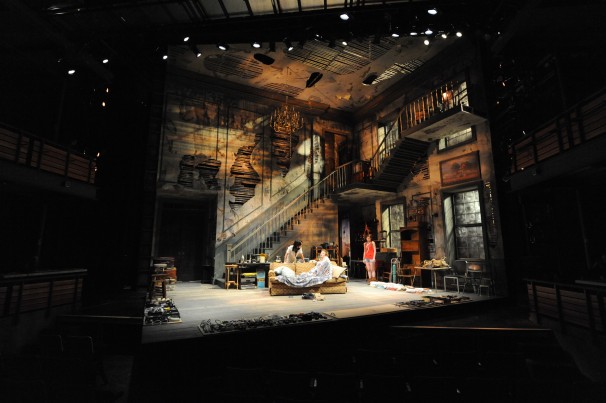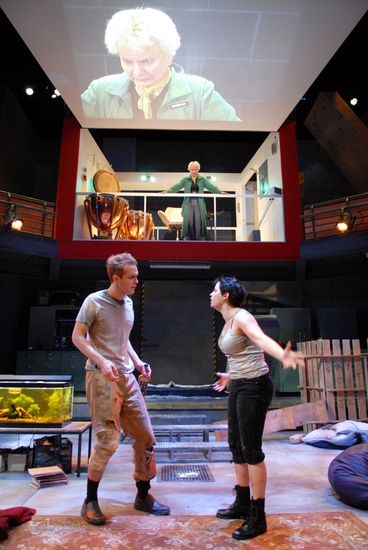|
JACQUELINE LAWTON: How long have you lived and worked as a stage manager in DC? What brought you here? Why have you stayed?
KRISTY MATERO: I have been in DC since the summer of 2007. I moved here after an internship ended because my boyfriend (now my husband) was working at Arena Stage. I’d heard from a few people that DC was a great theatre town. I’ve stayed because I love the people here. JL: What excites you most about being a stage manager? What do you feel your greatest challenges are? KM: Every day you are wearing so many hats from office manager to psychologist to mom to artistic collaborator. That’s what makes it fun. Tech is my favorite. During that week everyone is finally in the room together and you can see how it all fits to make a beautiful whole. And I am in the privileged position of pulling the strings in that moment when all of the puzzle pieces come together. The biggest challenge for me right now is balancing motherhood and work, which is a clichéd challenge but very real. I have a 7 month old son and going back to work this fall was tough. I’ve learned that it is ok to cut myself some slack. I don’t need to feel guilty for taking my lunch break to eat and nap instead of having a sandwich over the copier or resetting the rehearsal room. It’s a balancing act for sure. JL: What traits do you feel a successful Stage Manager should have to support the health and growth of a production? KM: Every stage manager is a bit different in their approach to the job, just as every director, designer and actor comes into a production with their own process. There are plenty of tangibles that make a good stage manager such as organizational skills, tact, ability to multitask and great communication skills. One of the hardest and most important things for me is being able to keep the big picture in your mind while dealing with all of the hundreds of details that are thrown your way. There are also the intangibles which are just as important. Being able to read the room and know whether it’s time to be tough and push a little or sit back and let the magic happen is something that is learned over time and that I am still working on. JL: Does your work as a Stage Manager pay the bills? If not, what other work do you do and how do you find a balance? KM: In the past I have held all of the typical day jobs from cashier to server to a memorable 6 months as a dog walker. Right now, I am stage managing full time and it pays the bills if I’m very frugal. The rest of my time right now is spent with the baby. JL: Looking at your body of work as a stage manager in this community, how conscious are you of selecting plays by women or people of color when deciding your season? KM: Unfortunately, at this point in my career I am not yet in a position where I can accept or reject a job based on the script. Looking back through my productions, I do tend to return to companies who have a commitment to new work which more and more often includes that of women and people of color. JL: How do you feel the DC theatre community has addressed the issues of race and gender parity? How has this particular issue impacted you and your ability to work? KM: I think that the DC theatre community has become much more aware of race and gender in theatre even in the six years that I have been here. I do believe that DC audiences want to see a diversity of plays and some theatres are recognizing and meeting that need. I have been fortunate to work with many companies who have the flexibility in their mission statement to address those issues, but it’s certainly a work in progress. JL: DC audiences are ... KM: Loyal, enthusiastic, intelligent to a fault. JL: DC actors, designers and directors are... KM: Some of the most creative, driven, and fun people that I have had the privilege to work with. JL: DC critics are ... KM: A small part of the whole. I think that it’s a shame that they have the power to make or break a play that may be very good but not necessarily to one person’s taste. My relationship with reviews is mostly to keep them out of sight and out of mind. Most theaters have a no discussing reviews policy in the building or with the actors so we enforce that. JL: What advice do you have for an up and coming DC based stage managers? KM: Go see everything you can and talk to people. I have gotten most of my jobs in DC from word of mouth so don’t be afraid to approach other SMs, directors, designers and actors and tell them what you do. I can’t tell you the number of times that I have been asked if I know someone who could do this or that production. If you have another technical skill, use it. There are plenty of people who have moved into stage management from being a dresser, stage hand, house manager, or spot op. Also, send out your resume to everyone. You never know when your material will land on someone’s desk at just the moment when they are looking for someone to fill that empty slot in their season. JL: What's next for you as a stage manager? Where can we keep up with your work? KM: Although I mostly do plays, I actually have two operas coming up with the Washington National Opera at The Kennedy Center. I will be ASMing Moby Dick in February and The Magic Flute in May.
0 Comments
Your comment will be posted after it is approved.
Leave a Reply. |
My BlogI'm a playwright, dramaturg, and teaching artist. It is here where you'll find my queries and musings on life, theater and the world. My posts advocate for diversity, inclusion, and equity in the American Theatre and updates on my own work. Please enjoy!
Categories
All
Archives
June 2020
Reading List
|



